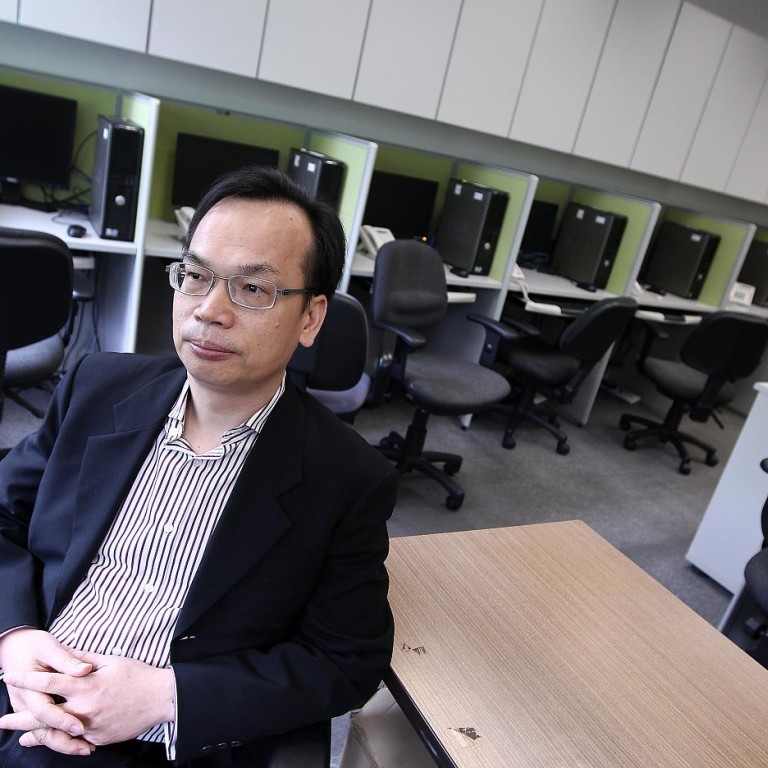
Chinese University pollster calls for calm after personal attacks on HKU counterpart
Chinese University researcher defends chief of rival public opinion programme, warning personal attacks are never part of rational debate
Critical discussion of public opinion polls is to be welcomed - but not when it descends into personal attacks on researchers, says the chief pollster at Chinese University.
Dr Victor Zheng Wan-tai spoke out in response to the personal abuse suffered by his counterpart at the University of Hong Kong following a tycoon's criticism of HKU's public opinion surveys.
Tycoon Peter Lee Ka-kit had accused the HKU public opinion programme of publishing polls unfavourable to the central and Hong Kong governments "at critical moments" and setting the stage for demands from the opposition camp. He suggested business chambers hire other institutions, such as Chinese University, to run surveys "truly reflecting the public's views".
Since then, internet users and commentators in Beijing-loyalist media have called the director of the HKU public opinion programme, Dr Robert Chung Ting-yiu, a "liar" and a "hypocrite".
"These comments do not contribute to rational discussions in our society," said Zheng, who heads the telephone survey research laboratory of Chinese University's Institute of Asia-Pacific Studies.
"Scientific research should be able to withstand challenges," said Zheng. "So when there are criticisms about polls, we can discuss them and unveil our data - but we should not make personal attacks, such as [speculating on] the political or financial background of a poll."
He called for discussions to "be conducted based on objective facts" and vowed that his team would remain independent in their work, even when asked to take part in external collaborative projects.
He downplayed the tycoon's ideas as merely his own "personal opinions" and said they would not threaten academic freedom in the city - contrary to what Chung's supporters had said.
Lee had not approached Zheng's institute despite what the tycoon had suggested, the researcher added.
"It's a positive thing if he wants more resources to support public opinion polls, because there has been too little research on local issues," Zheng said.
"But, [if he approached us,] our academic principles would of course remain top priority: we would insist on being scientific, neutral and free in our research."
He emphasised that academic independence and values always came first when his institute decided whether to accept an external assignment, be it from a business conglomerate or a political party.
He also endorsed Chung's analogy that a pollster was like the child who dared to speak the truth in the classic tale .
In January, a week before Chief Executive Leung Chun-ying delivered his policy address, a survey by Zheng's team found 45 per cent of people had "no expectations" for the speech.
On the Occupy Central democracy movement, Zheng and his colleagues published a series of commentaries last summer that elaborated on their poll findings, which included a 50 per cent public disapproval rate for the campaign.
In contrast, Chung has been commissioned by Occupy Central to hold public opinion polls, a New Year's Day "referendum" and a series of focus-group discussions on electoral reform. He maintains he is politically neutral and is only providing a "professional service with full autonomy" because the movement matches his academic goals for democratic deliberation and public empowerment.
Zheng said his team tracked and analysed social developments purely from an academic point of view. "We reviewed plenty of literature beforehand to understand the situation and to set questions seriously … because the ways questions are asked can have a big effect on the outcome," he said.
"So we worked hard on being neutral, objective and effective in gauging public views."
The Occupy Central campaign plans to rally protesters to blockade Central district this summer if the government has not come up with what it sees as a satisfactory plan to implement universal suffrage for the chief executive election in 2017.
Zheng declined to comment on Chung's collaboration with Occupy Central, but said that as pollsters, his team would prefer "not to take part in political activities, because people could find fault with your political stance".
He said that while his lab might be known more for its monthly polls on the popularity of government officials, its team of about 50 researchers was more "academically inclined" and regularly supported the research of other Chinese University social scientists.

